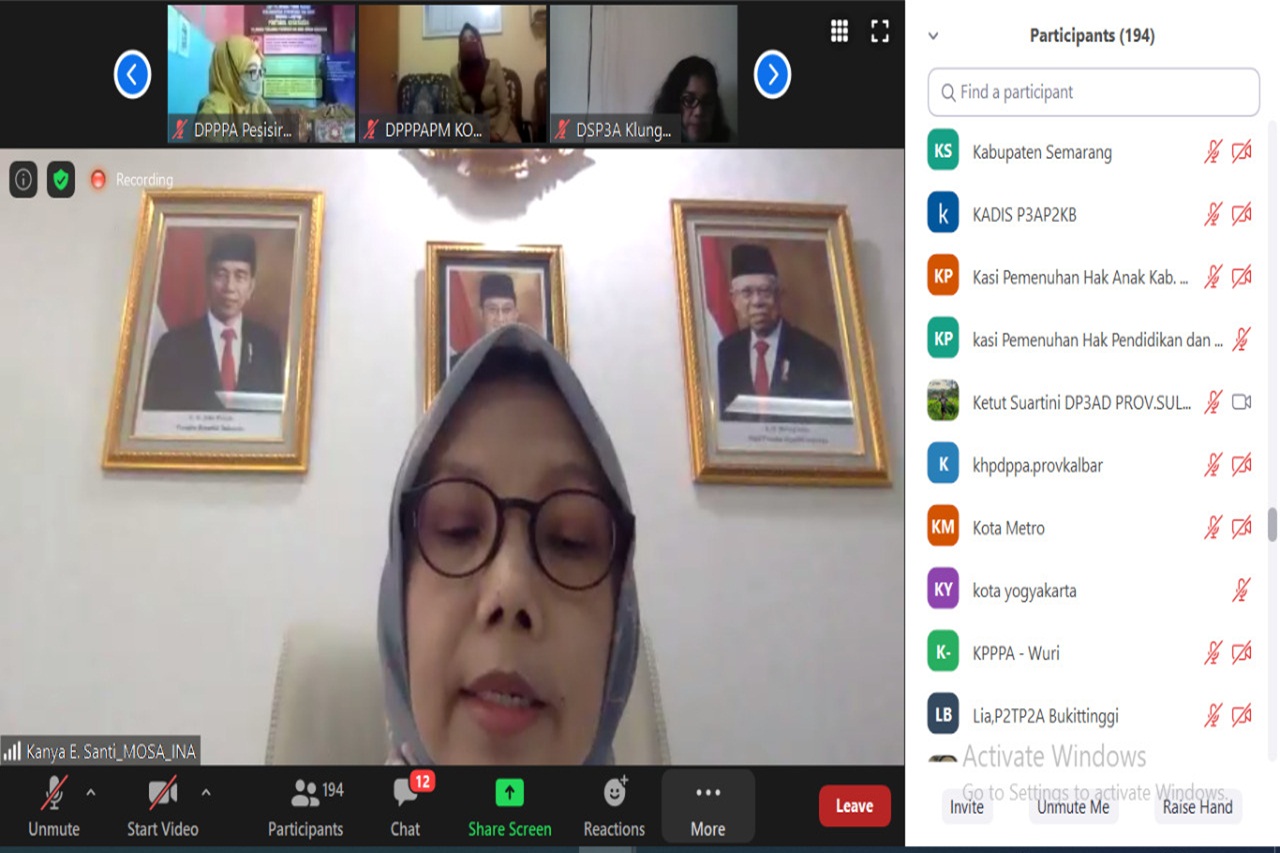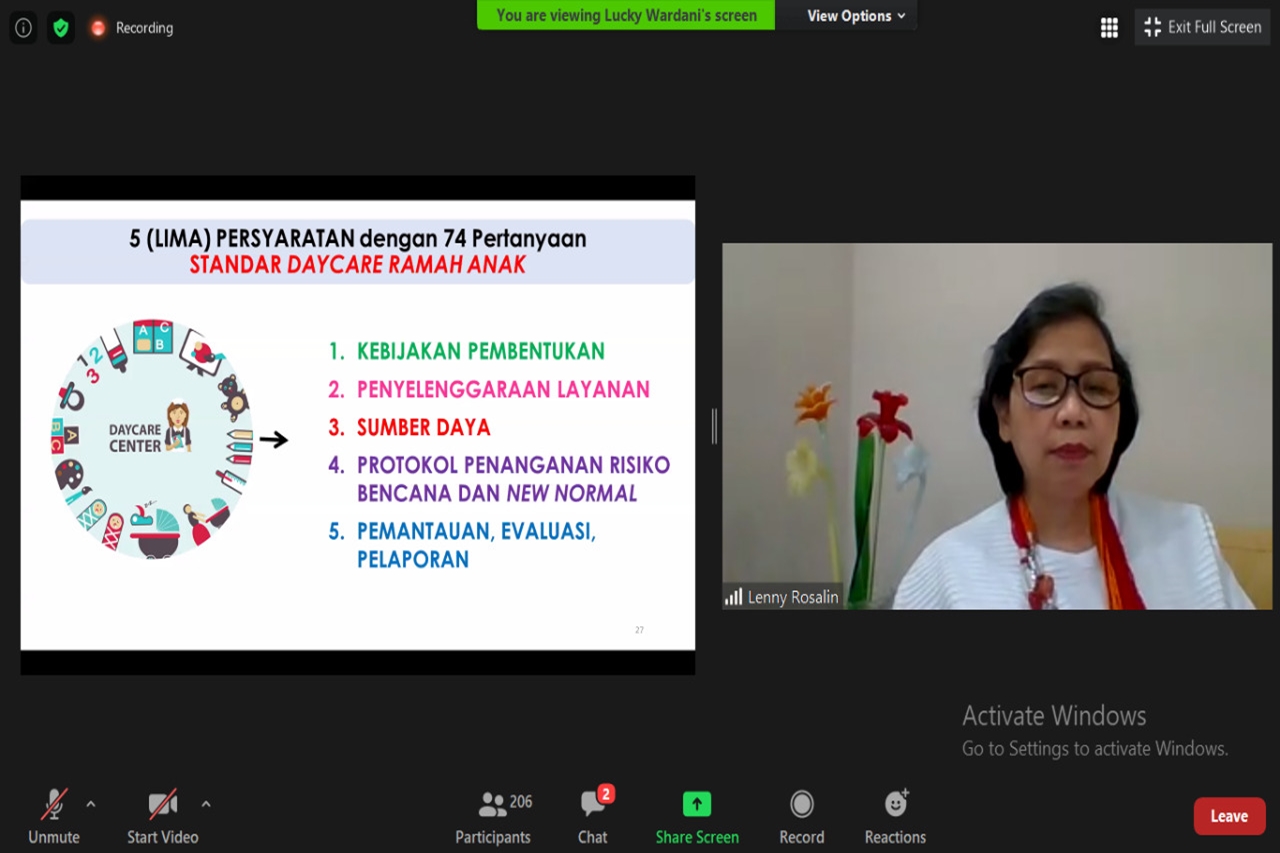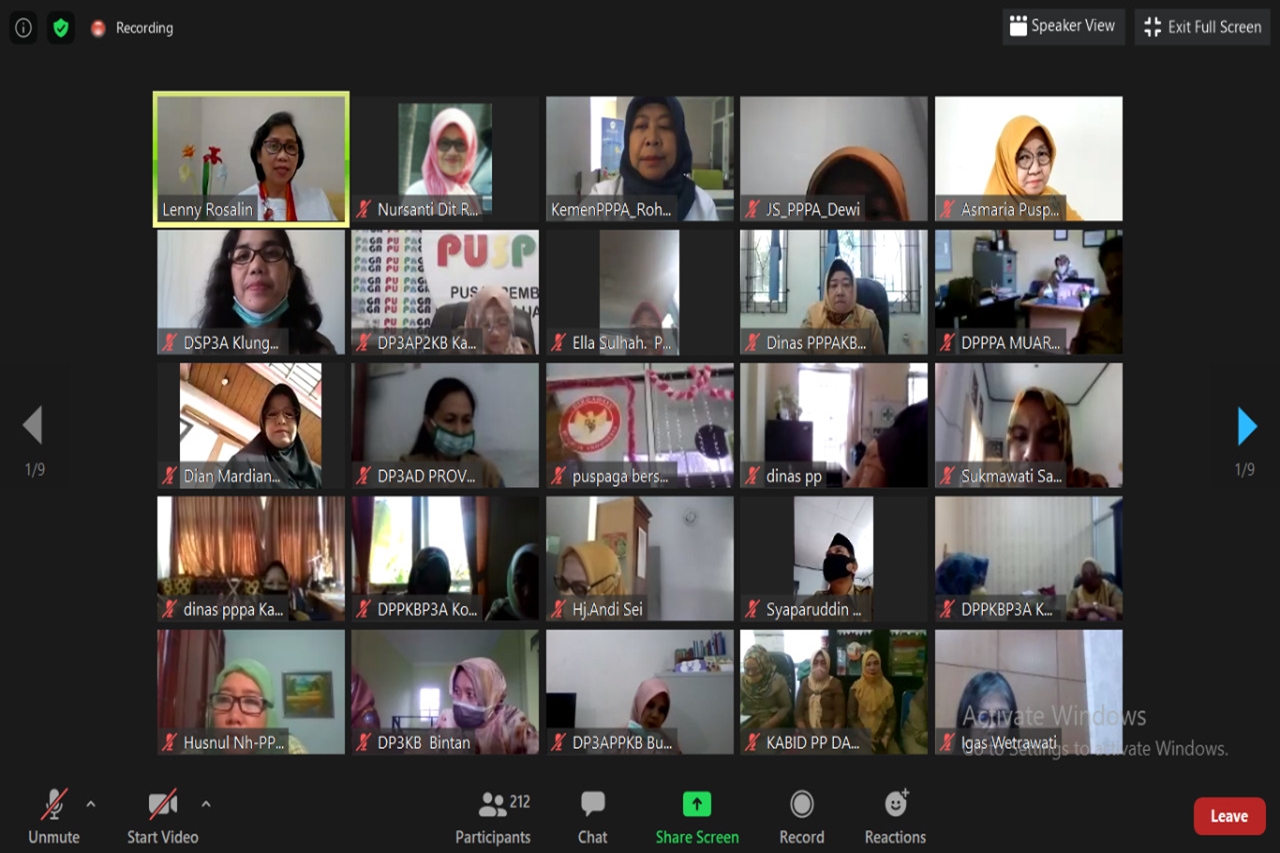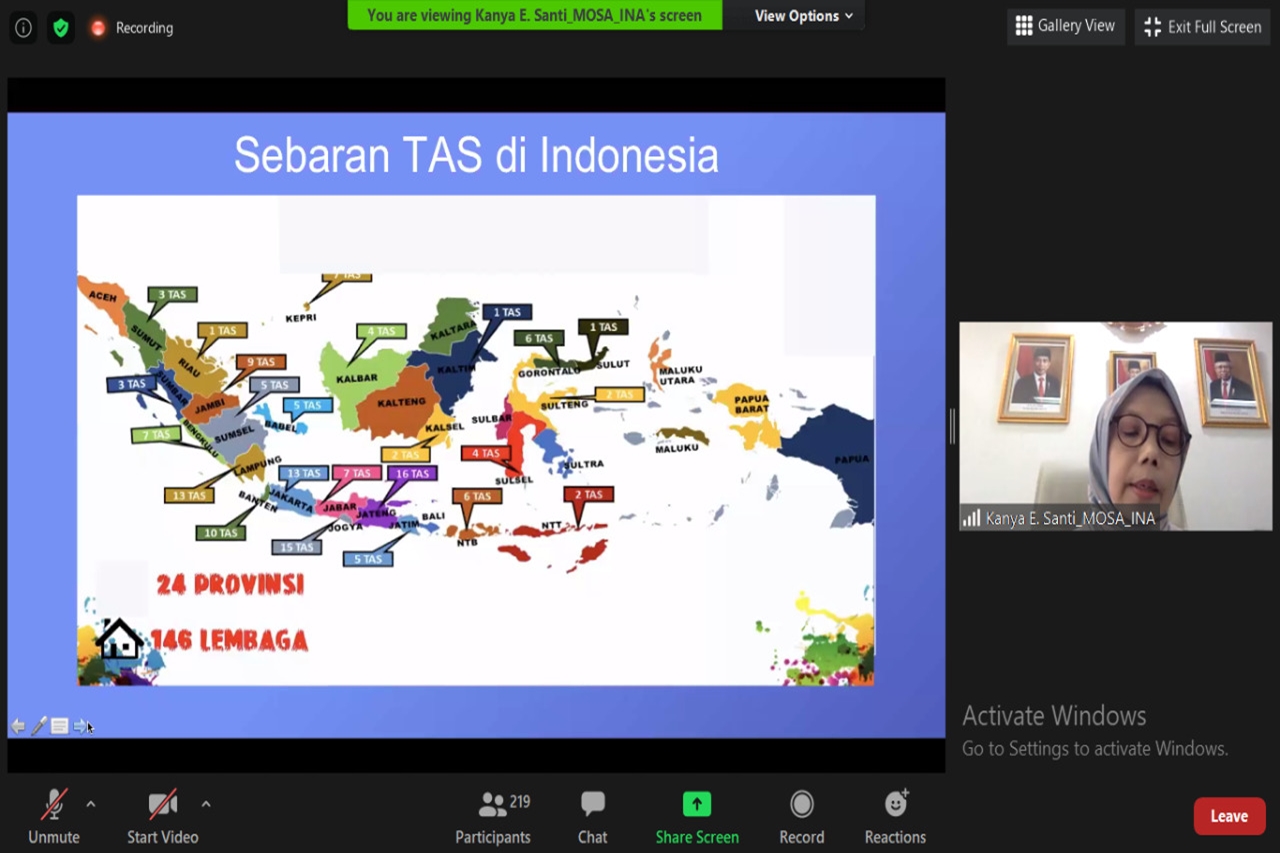Writer :
Humas Ditjen Rehsos Anak
Editor :
Annisa YH
Translator :
Intan Qonita N
JAKARTA (August 24, 2020) - Director of Child Social Rehabilitation, Kanya Eka Santi as a virtual speaker at the Coordinating Meeting for Harmonization of Daycare Development as Strengthening Child Care in the 2020-2024 RPJMN organized by the Ministry of Women and Child Protection Empowerment (KPPPA). This activity was attended by the Ministry of Social Affairs, Ministry of PP/Bappenas, KPPPA and Ministry of Education and Culture, Tunas Cilik Foundation and the PPPA Service.
The Ministry of Social Affairs utilizes the Prosperous Children's Park (TAS) as a mechanism to assist families in child development and to maintain the possibility of separation of children from their families. "Child protection policies also need to ensure that children are protected from violence, neglect or other forms of exploitation wherever they are," said Kanya.
The Director of Social Welfare for Children explained that the realization of child welfare through care, care, education, health, and protection is the goal of TAS. "Through TAS, we hope to prevent child neglect/abandonment and institutionalization," said Kanya.
Many poor parents are trapped in leaving their children in institutions. Therefore, TAS is indispensable for those in need. Based on the Integrated Social Welfare Data (DTKS) requiring Child Social Welfare Services in May 2020, there were 8,507 children under five from poor families, discarded, undocumented and in need of replacement families.
"Children who enter TAS are in a condition that requires recovery and development. In this case, the Ministry of Social Affairs prevents social dysfunction so that the connection between efforts to realize children's welfare is in line with the mandate given to us," said Kanya.
Daycare planning in the context of the 2020-2024 RPJMN policy was further explained by the Director of Family, Women, Children, Youth and Sports of the Ministry of National Development Planning/Bappenas, Woro Srihastuti Sulistyaningrum. This is in accordance with the vision and mission of the President of the Republic of Indonesia as stated in the promise, namely massive child care to take care of the baby while the parents are working.
The Ministry of Social Affairs utilizes the Prosperous Children's Park (TAS) as a mechanism to assist families in child development and to maintain the possibility of separation of children from their families. "Child protection policies also need to ensure that children are protected from violence, neglect or other forms of exploitation wherever they are," said Kanya.
The Director of Social Welfare for Children explained that the realization of child welfare through care, care, education, health, and protection is the goal of TAS. "Through TAS, we hope to prevent child neglect/abandonment and institutionalization," said Kanya.
Many poor parents are trapped in leaving their children in institutions. Therefore, TAS is indispensable for those in need. Based on the Integrated Social Welfare Data (DTKS) requiring Child Social Welfare Services in May 2020, there were 8,507 children under five from poor families, discarded, undocumented and in need of replacement families.
"Children who enter TAS are in a condition that requires recovery and development. In this case, the Ministry of Social Affairs prevents social dysfunction so that the connection between efforts to realize children's welfare is in line with the mandate given to us," said Kanya.
Daycare planning in the context of the 2020-2024 RPJMN policy was further explained by the Director of Family, Women, Children, Youth and Sports of the Ministry of National Development Planning/Bappenas, Woro Srihastuti Sulistyaningrum. This is in accordance with the vision and mission of the President of the Republic of Indonesia as stated in the promise, namely massive child care to take care of the baby while the parents are working.
Daycare services include child welfare services, early childhood education and care. Currently, there are various similar services but they are not well integrated. For example, the Ministry of Social Welfare Children's Park (TAS), the Ministry of Education's Child Care Center (TPA), the Ministry of Education and Culture's Early Childhood Education (PAUD) and commercial/private Daycare.
"The concept of daycare services developed by KPPPA should answer existing gaps or strengthen existing services to ensure that children's rights are fulfilled and the community has easy access to services," said Woro.
KPPPA's Deputy for Child Development, Leny Nurhayati Rosalin Rosalin said that the Child Friendly Daycare Taman Asuh Gembira (TARA) is a childcare service unit that synergizes with the PPPA Service as a technical service that carries out matters of fulfilling children's rights.
"TARA is provided by the company, so it can also be held in industrial center areas where there are many women workers," said Leny. This step is a strategy to realize a Child-friendly Indonesia through strengthening the Child Protection System that is responsive to the diversity and character of the region and children to enjoy their rights.
The Ministry of Education and Culture through the Directorate of Early Childhood Education, which was delivered by Lestari Kusuma Wardani, conveyed the policy to improve the quality of Child Care Parks (TPA). The PAUD program is an integration of education, care, protection, health and nutrition services which are organized in the form of units or programs.
"TPA is a form of non-formal PAUD unit that organizes educational programs for children from birth to the age of 6 (six) years with priority from birth to age 4 years," said Lestari.
The Ministry of Social Affairs already has the TAS "Harapan Ibu (Hope of Mother)" as a Pilot TAS that provides services, care, nursing, and protection. In addition, TAS is a center for information, consultation, advocacy and implementation of the Children's Social Rehabilitation Program.
Along with the Child Social Rehabilitation Assistance (ATENSI) program, TAS services are not only carried out in institutions but also by groups, families, neighbors based on a very selective determination and will be tested through the Ministry of Social Children's Center/Loka.
"The concept of daycare services developed by KPPPA should answer existing gaps or strengthen existing services to ensure that children's rights are fulfilled and the community has easy access to services," said Woro.
KPPPA's Deputy for Child Development, Leny Nurhayati Rosalin Rosalin said that the Child Friendly Daycare Taman Asuh Gembira (TARA) is a childcare service unit that synergizes with the PPPA Service as a technical service that carries out matters of fulfilling children's rights.
"TARA is provided by the company, so it can also be held in industrial center areas where there are many women workers," said Leny. This step is a strategy to realize a Child-friendly Indonesia through strengthening the Child Protection System that is responsive to the diversity and character of the region and children to enjoy their rights.
The Ministry of Education and Culture through the Directorate of Early Childhood Education, which was delivered by Lestari Kusuma Wardani, conveyed the policy to improve the quality of Child Care Parks (TPA). The PAUD program is an integration of education, care, protection, health and nutrition services which are organized in the form of units or programs.
"TPA is a form of non-formal PAUD unit that organizes educational programs for children from birth to the age of 6 (six) years with priority from birth to age 4 years," said Lestari.
The Ministry of Social Affairs already has the TAS "Harapan Ibu (Hope of Mother)" as a Pilot TAS that provides services, care, nursing, and protection. In addition, TAS is a center for information, consultation, advocacy and implementation of the Children's Social Rehabilitation Program.
Along with the Child Social Rehabilitation Assistance (ATENSI) program, TAS services are not only carried out in institutions but also by groups, families, neighbors based on a very selective determination and will be tested through the Ministry of Social Children's Center/Loka.
Share :
 English
English
 Bahasa
Bahasa




